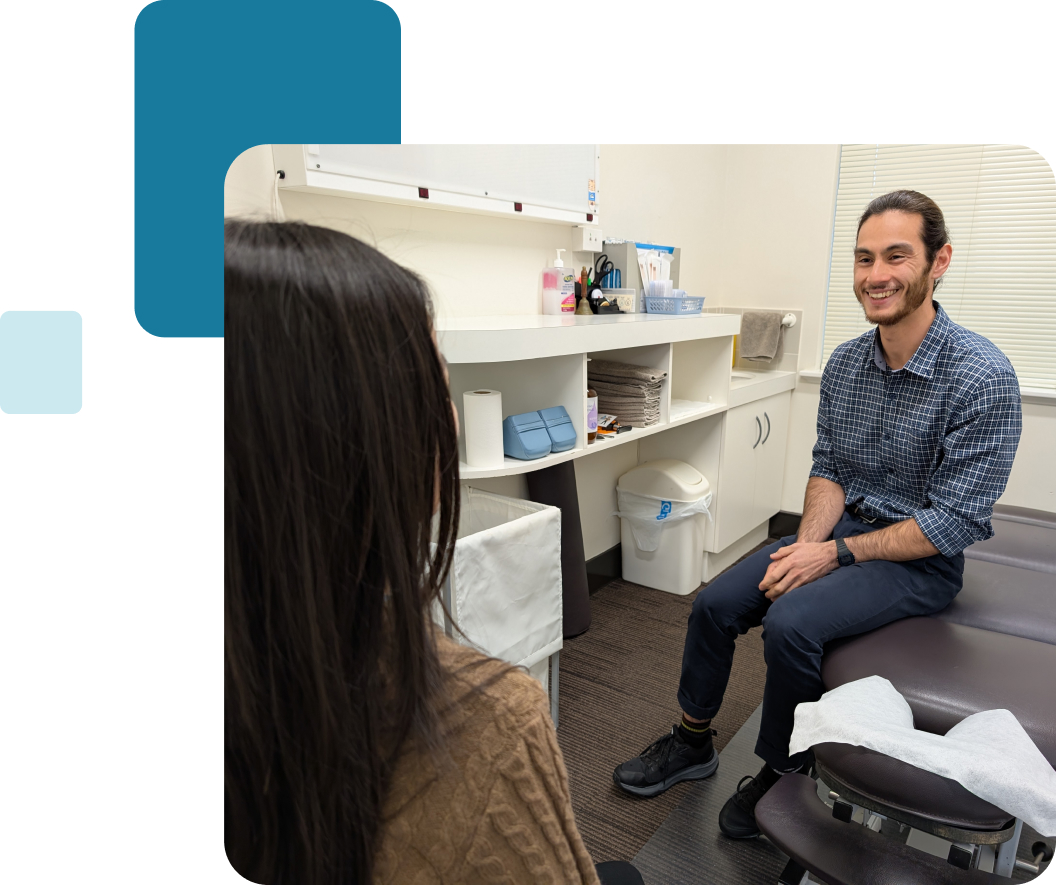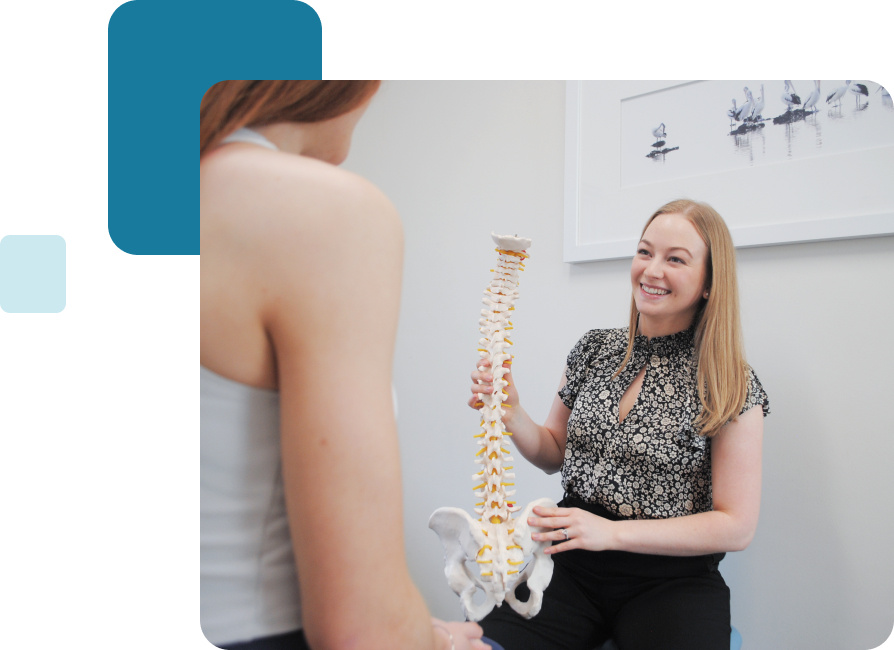When it comes to caring for your neck and spine, you want experienced, approachable, and skilled professionals.
Our chiropractors combine years of clinical experience with a commitment to supporting your movement, comfort, and overall wellbeing.

21 Harvey St, Burswood WA 6100
Neck pain can limit your movement and focus, our Burswood chiropractors offer evidence-based care to help ease your discomfort.
Experience That Matters
With years of experience serving the Burswood community, our chiropractors provide professional, evidence-based care for people experiencing neck discomfort.
Personalised Care for Every Patient
Every case of neck pain is different. We begin with a thorough assessment to understand your symptoms, then tailor a care plan that may include:
Gentle spinal and neck adjustments
Soft tissue therapy
Exercise-based rehabilitation for posture and strength
Dry needling
Ergonomic and movement advice
Our focus is on supporting your recovery and helping you move more comfortably.
Support for Relief and Prevention
We aim to not only manage your symptoms but also support strategies that may help reduce future discomfort through guided exercise and education.
Looking for a chiropractor in Burswood? Book a 15 mins complimentary health assessment with our experienced team to discuss your neck concerns.

When it comes to caring for your neck and spine, you want experienced, approachable, and skilled professionals.
Our chiropractors combine years of clinical experience with a commitment to supporting your movement, comfort, and overall wellbeing.
Our clinic is centrally located in Burswood, with free on-site parking so you can arrive stress-free. We’ve also created a child-friendly waiting area to make your visit more comfortable for families.
Opening Hours:
Monday, Wednesday, Friday: 8:00 am – 6:00 pmWhether you’re coming in before work, during your lunch break, or on a Saturday morning, we offer flexible hours to fit your schedule.
Find Us In Your Neighbourhood

We aim to make quality chiropractic care accessible for everyone in our community.
Gap-only payments available with all major health funds. Learn More
Initial consultation – $139: includes a comprehensive assessment and discussion of your treatment options.
15-minute complimentary health assessment: an opportunity to talk about your concerns and learn whether chiropractic care may be suitable for you. Claim now.
1) Can a chiropractor help with neck pain?
Chiropractors assess how your joints, discs, nerves, and muscles are functioning together. Care may include gentle spinal or neck mobilisation, soft-tissue therapy, exercise rehabilitation, posture advice, or other evidence-based techniques such as dry needling or laser therapy where appropriate. The goal is to support mobility and comfort.
2) What usually causes neck pain?
Common causes include muscle strain, poor posture, joint irritation, headaches originating from the neck, whiplash, arthritis, or nerve irritation. Your chiropractor will assess which factors are relevant to you before recommending care.
3) How many sessions will I need?
This varies depending on your condition, duration of symptoms, and individual response to care. Your chiropractor will discuss an appropriate plan and review progress regularly.
4) Is chiropractic care for the neck safe?
When provided by a qualified and registered chiropractor, spinal care is considered safe for most people. Techniques are selected to suit your presentation, and we explain each step. Mild post-treatment soreness can occur and usually resolves within a day or two.
5) Do adjustments have to “crack” my neck?
No. The sound sometimes heard during adjustments is gas release within the joint and is not required for effective care. Gentle, low-force options are always available.
6) Will I need X-rays or an MRI?
Imaging is not routinely required. It may be recommended if there has been trauma, progressive neurological changes, or if recovery does not follow the expected pattern. Your chiropractor will advise and arrange referrals where appropriate.
7) What are neck pain “red flags” that need urgent care?
Seek prompt medical advice if you experience arm or hand weakness or numbness, loss of coordination, severe or persistent night pain, fever, unexplained weight loss, significant trauma, or a sudden severe headache with neurological changes. If you are unsure, contact your healthcare provider for guidance.
8) Can chiropractic help headaches related to the neck?
Some headaches may be associated with neck tension or stiffness. Your chiropractor can assess contributing factors and discuss suitable care options or referrals.
9) What if my neck pain includes arm tingling or a “pinched nerve”?
This may indicate nerve involvement. Your chiropractor will assess your symptoms and may recommend specific exercises, gentle mobilisation, or referral for further medical assessment if needed.
10) Is care suitable if I have arthritis or degeneration?
Yes. Techniques can be modified to suit people with osteoarthritis or age-related changes. The focus is on improving mobility and function within safe limits.
11) What about whiplash after a car accident?
Chiropractors can assess soft-tissue and joint involvement following whiplash. Care is typically gentle and progresses as healing occurs. We can also liaise with your GP or insurer when appropriate.
12) Can chiropractic help dizziness or vertigo linked to the neck?
Certain types of dizziness can be associated with neck function. Your chiropractor will assess contributing factors and may suggest specific exercises or refer you if other causes are suspected.
13) Will treatment hurt?
Chiropractic techniques are tailored to your comfort level. Mild tenderness can occur as tight tissues adjust, but care should never feel forceful or painful.
14) How should I sleep with neck pain? What pillow should I use?
Side sleeping: keep your head aligned with your spine and choose a pillow that fills the space between your shoulder and neck.
Back sleeping: use a medium-height pillow supporting your neck’s natural curve.
Stomach sleeping: can strain the neck—try to avoid it.
Your chiropractor can provide pillow advice during your visit.
15) What can I do at home between visits?
Take regular breaks from screens, perform gentle mobility or strengthening exercises as advised, use heat for muscle tension or ice for recent irritation, and maintain good workstation posture.
16) Will I have to keep coming forever?
No. The aim is to help you self-manage your condition over time. Some people choose periodic reviews for guidance, but this is optional.
17) Do I need a referral?
No referral is required to see a chiropractor. Your chiropractor may communicate with your GP or other providers where collaborative care is beneficial.
18) Is chiropractic suitable during pregnancy or for older adults?
Yes. Techniques can be adapted to suit pregnancy, bone health, and comfort. Safety screening is always performed before care.
19) What should I wear or bring to my appointment?
Wear comfortable clothing that allows movement. Bring any relevant imaging, medical reports, or medication details, as well as your health fund card if applicable.
20) Do you offer gap-only payments? What are the fees?
Gap-only claiming is available with most major health funds (eligibility applies). The initial consultation fee is $139, which includes a comprehensive assessment and discussion of care options. A short 15-minute introductory appointment is also available for people who wish to discuss their concerns before proceeding.
21) How quickly can I get an appointment?
We offer same-day and next-day appointments where available. You can check current availability and book online or by phone.